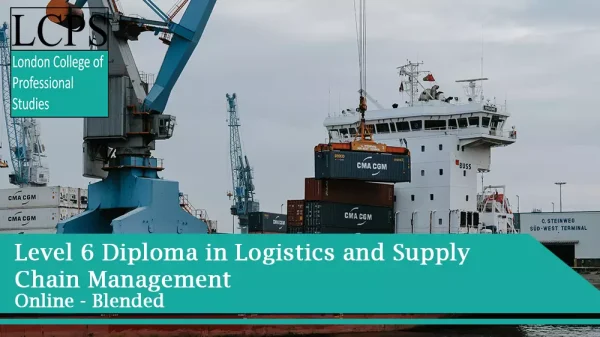02 – 05 Months
City & Guilds – ILM
Overview
The ILM Level 6 Certificate in Leadership and Management is an ideal qualification for experienced managers who want to enhance their leadership and management capabilities. By developing your strategic thinking, communication, performance management, and decision-making skills, this qualification will prepare you for senior management roles and provide you with the confidence and expertise to lead organisations successfully. Whether you’re aiming to move into executive roles or improve your current leadership practice, the ILM Level 6 Certificate is a powerful tool for career development.
Delivery Methods
To cater to different learning styles and preferences, the London College of Professional Studies (LCPS) offers a range of flexible delivery methods, allowing learners to study in a way that suits their needs and schedules.
Learners will be able to:
Access all course materials – including online modules, study guides, and written assignments.
Receive expert tutor support throughout the course.
Use the LCPS Online Learning Portal – available 24/7, providing a user-friendly platform for all study resources.
Obtain detailed assignment briefings to guide assessment preparation.
Access high-quality study notes designed to support learning and understanding.
Receive assignment feedback and marks to monitor progress and improvement.
Earn a fully accredited UK qualification upon successful completion.
Get dedicated customer support via chat, telephone, or email (Monday to Friday).
Enjoy full academic and administrative support from enrolment to course completion.
Duration
ILM Level 6 Certificate in Leadership and Management is available in 2 duration modes:
- 02 Months (Fast Track)
- 05 Months
Accreditation
The ILM Level 6 Certificate in Leadership and Management is accredited by (Institute of Leadership and Management.), an Ofqual-regulated awarding body.

Course Delivery
- Online
Entry Requirements
These qualifications are designed for learners who are typically aged 19 and above.
The entry profile for learners is likely to include at least one of the following:
- Relevant Level 5 Diploma qualification or equivalent qualification, or
- Substantial experience as a manager or supervisor
Module Structure
Certificate – overall a minimum of 15 credits from (504, 514, 522, 529,550, 601-612, 717).- A minimum of 8 credits must be from (601-612)
- A maximum of 7 credits can be taken from (504, 514, 522, 529, 550, 717)
| Unit No | Unit title | Level | Credit Value |
|---|---|---|---|
| 601 | Developing personal effectiveness and impact | 6 | 6 |
| 602 | Developing critical thinking | 6 | 8 |
| 603 | Progressive discourse in modern leadership | 6 | 10 |
| 604 | Delivering outcomes through people | 6 | 12 |
| 607 | Leading a sustainable and future focused organisation | 6 | 5 |
| Unit No | Unit title | Level | Credit Value |
|---|---|---|---|
| 504 | Leading Innovation and Change | 6 | 5 |
| 514 | Managing Recruitment | 6 | 5 |
| 522 | Becoming an Effective Leader | 6 | 5 |
| 717 | Evolving approaches in leadership and management | 6 | 7 |
Modules Details
Unit 601: Developing personal effectiveness and impact- The learner will be able to apply the meta skills required for an effective manager
- The learner will understand leader behaviours within an organisation
- The learner will be able to apply their understanding of crisis management, agility and resilience to improve their personal impact.
- The learner will understand enquiry-based approaches to research within own operational environment.
- The learner will understand problem solving and decision-making models/techniques within own operational environment.
- The learner will be able to apply critical thinking as a management behaviour.
- The learner will understand leadership and management theories, including their implications for future practice
- The learner will understand the impact of own leadership identity and personal leadership brand in supporting influencing, engagement and collaboration
- The learner will understand own ability to support an inclusive, innovative and diverse culture
- The learner will understand own role in the planning, recruitment, retention and wellbeing of people
- The learner will be able to lead high-performing teams
- The learner will understand how to support the principles and practices of learning and development in a high-performing team
- The learner will understand the impact of an organisation’s ability to act responsibly
- The learner will develop a plan based on drivers for change which provides a future-focus strategy for sustainable organisations
- The learner will understand the need for innovation and change management within an organisation
- The learner will be able to propose innovative solutions to improve organisational performance
- The learner will understand human resource planning in an organisation
- The learner will be able to plan and implement recruitment in line with legal and organisational requirements
- The learner will understand own ability to fulfil key responsibilities of the leadership role
- The learner will be able to be able to evaluate own ability to lead others
- The learner will understand innovation and change in an evolving world and potential impacts on leadership and management.
- The learner will be able to create a development plan taking into consideration potential impacts on evolving leadership and management practices
What could this qualification lead to?
Career opportunities
Employment:- Senior Manager/Team Leader
- Operations Manager
- Project Manager
- Department Head or Division Manager
- Change Manager
- Coventry University
- Canterbury Christ Church University
- Sunderland University
- Bath Spa University
- Buckinghamshire University
- University of Derby
- University of Northampton
- Anglia Ruskin University
- University of Portsmouth
- and others.
Progression
- After completing the Level 6 Certificate, you can progress to the ILM Level 7 Diploma in Strategic Management and Leadership, which focuses on advanced strategic leadership and management at the executive level.
- Master’s Degree:
- The ILM Level 6 Certificate can act as a pathway to further education, including a master’s degree (MBA) in leadership, management, or business administration.
Assessment
- Assessment is via assignment submission only
- No Exams
- There are no practical observations required to complete this course




